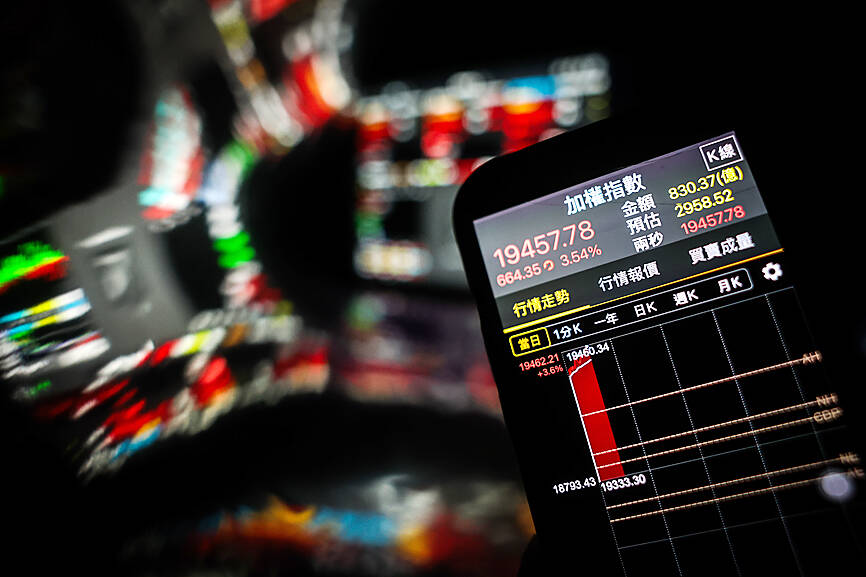Shares in Taiwan recorded their second-highest daily point gain in history yesterday amid the possible easing of trade tensions between the US and China, and after US President Donald Trump indicated that he would not dismiss US Federal Reserve Chair Jerome Powell.
The TAIEX closed up 845.71 points, or 4.5 percent, at 19,639.14. Turnover on the main board totaled NT$269.098 billion (US$8.28 billion), Taiwan Stock Exchange data showed.
The point gain in the TAIEX was the second highest on record, trailing only a 1,608.27-point spike on April 10 after Trump suspended for 90 days most of the draconian “reciprocal” tariffs he announced on April 2.

Photo: CNA
Hong Kong, Tokyo, Sydney, Seoul, Wellington, Singapore, Mumbai, Manila, Jakarta and Bangkok also advanced, while Shanghai edged down.
“Today’s upturn was completely driven by news that encouraged investors to think trade friction between Washington and Beijing is easing,” Mega International Investment Services Corp (兆豐國際投顧) analyst Alex Huang (黃國偉) said.
Trump had previously said he could fire Powell after the Fed paused cuts to short-term interest rates. However, the US president told reporters on Tuesday: “I have no intention of firing him.”
Investors were also cheered by comments from US Secretary of the Treasury Scott Bessent at a closed-door event in Washington, where Bessent said he expected “there will be a de-escalation” in Trump’s trade war with China in the “very near future.”
Trump also acknowledged on Tuesday that the US levies of 145 percent on Chinese goods were at a “very high” level, and that this would “come down substantially.”
After a 2.39 percent rise in its American depositary receipts overnight, Taiwan Semiconductor Manufacturing Co (台積電) surged 6.99 percent to close at NT$873 in Taipei trading and that contributed about 460 points alone to the TAIEX’s gains.
“Despite the gains in the TAIEX, turnover stayed low, indicating many investors were reluctant to chase prices, fearing an unpredictable Trump will say something to dampen investor sentiment and hurt the markets again,” Huang said. “Also, how Trump handles tariffs on semiconductors remains a big issue in the market.”
Additional reporting by AFP

In Italy’s storied gold-making hubs, jewelers are reworking their designs to trim gold content as they race to blunt the effect of record prices and appeal to shoppers watching their budgets. Gold prices hit a record high on Thursday, surging near US$5,600 an ounce, more than double a year ago as geopolitical concerns and jitters over trade pushed investors toward the safe-haven asset. The rally is putting undue pressure on small artisans as they face mounting demands from customers, including international brands, to produce cheaper items, from signature pieces to wedding rings, according to interviews with four independent jewelers in Italy’s main

Japanese Prime Minister Sanae Takaichi has talked up the benefits of a weaker yen in a campaign speech, adopting a tone at odds with her finance ministry, which has refused to rule out any options to counter excessive foreign exchange volatility. Takaichi later softened her stance, saying she did not have a preference for the yen’s direction. “People say the weak yen is bad right now, but for export industries, it’s a major opportunity,” Takaichi said on Saturday at a rally for Liberal Democratic Party candidate Daishiro Yamagiwa in Kanagawa Prefecture ahead of a snap election on Sunday. “Whether it’s selling food or

CONCERNS: Tech companies investing in AI businesses that purchase their products have raised questions among investors that they are artificially propping up demand Nvidia Corp chief executive officer Jensen Huang (黃仁勳) on Saturday said that the company would be participating in OpenAI’s latest funding round, describing it as potentially “the largest investment we’ve ever made.” “We will invest a great deal of money,” Huang told reporters while visiting Taipei. “I believe in OpenAI. The work that they do is incredible. They’re one of the most consequential companies of our time.” Huang did not say exactly how much Nvidia might contribute, but described the investment as “huge.” “Let Sam announce how much he’s going to raise — it’s for him to decide,” Huang said, referring to OpenAI

The global server market is expected to grow 12.8 percent annually this year, with artificial intelligence (AI) servers projected to account for 16.5 percent, driven by continued investment in AI infrastructure by major cloud service providers (CSPs), market researcher TrendForce Corp (集邦科技) said yesterday. Global AI server shipments this year are expected to increase 28 percent year-on-year to more than 2.7 million units, driven by sustained demand from CSPs and government sovereign cloud projects, TrendForce analyst Frank Kung (龔明德) told the Taipei Times. Demand for GPU-based AI servers, including Nvidia Corp’s GB and Vera Rubin rack systems, is expected to remain high,